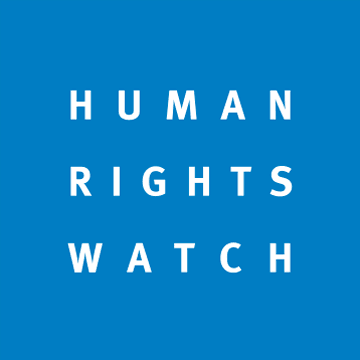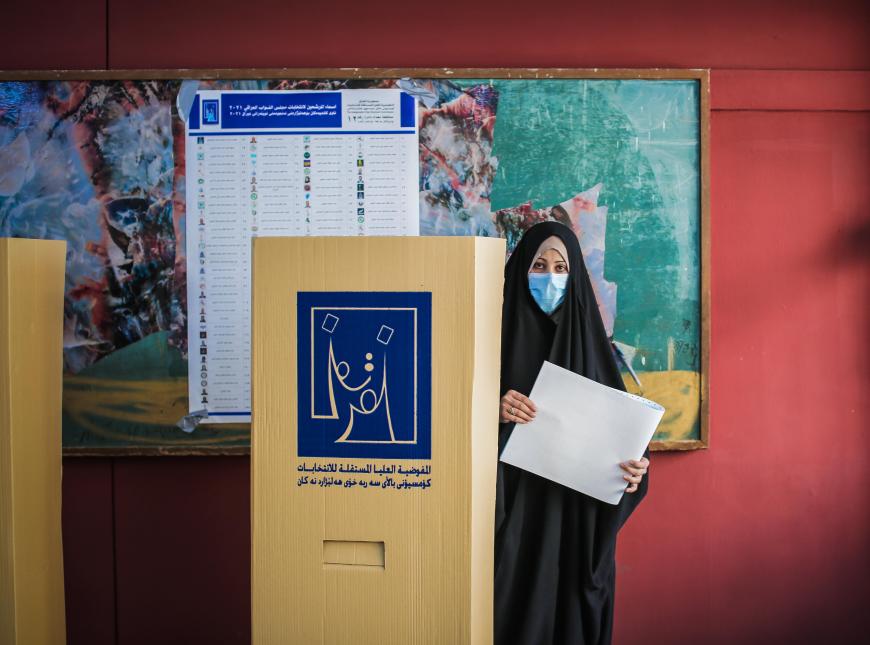Extrajudicial Killings, Enforced Disappearances Go Unpunished
The Iraqi government failed in 2021 to deliver on promises to hold to account those responsible for the abuse of protesters, activists, journalists, and critics of political elites and the Popular Mobilization Forces, Human Rights Watch said today in its World Report 2022.
The abuses included arbitrary arrests, enforced disappearances, and extrajudicial killings. In this accountability vacuum, armed groups fired three armed drones at the home of Prime Minister Mustafa al-Kadhimi on November 7 in an apparent attempt to kill him.
“The attempted assassination of Prime Minister al-Kadhimi vividly captures the impunity of Iraq’s armed groups,” said Belkis Wille, senior crisis and conflict researcher at Human Rights Watch. “They are not afraid to launch even a brazen attack on the country’s leader.”
In the 752-page World Report 2022, its 32nd edition, Human Rights Watch reviews human rights practices in nearly 100 countries. Executive Director Kenneth Roth challenges the conventional wisdom that autocracy is ascendent. In country after country, large numbers of people have recently taken to the streets, even at the risk of being arrested or shot, showing that the appeal of democracy remains strong. Meanwhile, autocrats are finding it more difficult to manipulate elections in their favor. Still, he says, democratic leaders must do a better job of meeting national and global challenges and of making sure that democracy delivers on its promised dividends.
The Iraqi government failed in 2021 to deliver on promises to hold to account those responsible for the abuse of protesters, activists, journalists, and critics of political elites and the Popular Mobilization Forces, Human Rights Watch said today in its World Report 2022.
The abuses included arbitrary arrests, enforced disappearances, and extrajudicial killings. In this accountability vacuum, armed groups fired three armed drones at the home of Prime Minister Mustafa al-Kadhimi on November 7 in an apparent attempt to kill him.
“The attempted assassination of Prime Minister al-Kadhimi vividly captures the impunity of Iraq’s armed groups,” said Belkis Wille, senior crisis and conflict researcher at Human Rights Watch. “They are not afraid to launch even a brazen attack on the country’s leader.”
In the 752-page World Report 2022, its 32nd edition, Human Rights Watch reviews human rights practices in nearly 100 countries. Executive Director Kenneth Roth challenges the conventional wisdom that autocracy is ascendent. In country after country, large numbers of people have recently taken to the streets, even at the risk of being arrested or shot, showing that the appeal of democracy remains strong. Meanwhile, autocrats are finding it more difficult to manipulate elections in their favor. Still, he says, democratic leaders must do a better job of meeting national and global challenges and of making sure that democracy delivers on its promised dividends.
During protests that began in October 2019 and continued into late 2020, clashes with security forces, including the Popular Mobilization Forces (PMF or hashad) nominally under the control of the prime minister, left at least 487 protesters dead in Baghdad and Iraq’s southern cities. When Prime Minister al-Kadhimi took office in May 2020 he formed a committee to investigate the killings of protesters but it had yet to announce any findings as of December 2021.
In February, the government announced the arrest of members of a “death squad” that had allegedly been responsible for killing at least three activists in the southern city of Basra. Baghdad authorities announced in July that they had arrested three low-level security forces officers linked to abuses against protesters, and one man allegedly responsible for the 2020 killing of a political analyst, Hisham Al-Hashem. The only police officer who was tried was sentenced to death in November for membership in the death squad.
On October 10, Iraqis voted for a new parliament with a turnout of only 36 percent. The movement of the prominent Shia cleric Moqtada al-Sadr secured the largest number of seats in peaceful elections. Despite its role in bringing about the elections, the youth movement won only 15 seats as of the initial seat count in early December. Some youth leaders were too fearful or unable to run because they had to flee their homes, while many in the movement were apparently disheartened that they felt there was no point to vote.
Throughout 2021, the Kurdistan Regional Government pursued numerous cases against journalists for their writing. In February, the Erbil Criminal Court sentenced three journalists and two activists to six years in prison each in proceedings marred by serious fair trial violations as well as high-level political interference. The court rejected the defendants’ claims of torture and ill-treatment, citing a lack of evidence. Another journalist was sentenced to one year for alleged “misuse of his cell phone” and defamation charges in June and September. Another four activists and journalists were arrested in 2020 and sentenced to between one and two years on November 8. Kargar Abbas and Bandawar Ayub received one year and two months in prison, Sherwan Taha was sentenced to two years and three months in prison, and Masud Ali was sentenced to three years and six months in prison.
“It is alarming to see Kurdistan authorities pursuing charges against people for protected speech and without any regard for the flawed nature of their trials,” Wille said. “By prosecuting these cases they are sending a clear signal to critical journalists to be silent.”
Source (Click Here)
In February, the government announced the arrest of members of a “death squad” that had allegedly been responsible for killing at least three activists in the southern city of Basra. Baghdad authorities announced in July that they had arrested three low-level security forces officers linked to abuses against protesters, and one man allegedly responsible for the 2020 killing of a political analyst, Hisham Al-Hashem. The only police officer who was tried was sentenced to death in November for membership in the death squad.
On October 10, Iraqis voted for a new parliament with a turnout of only 36 percent. The movement of the prominent Shia cleric Moqtada al-Sadr secured the largest number of seats in peaceful elections. Despite its role in bringing about the elections, the youth movement won only 15 seats as of the initial seat count in early December. Some youth leaders were too fearful or unable to run because they had to flee their homes, while many in the movement were apparently disheartened that they felt there was no point to vote.
Throughout 2021, the Kurdistan Regional Government pursued numerous cases against journalists for their writing. In February, the Erbil Criminal Court sentenced three journalists and two activists to six years in prison each in proceedings marred by serious fair trial violations as well as high-level political interference. The court rejected the defendants’ claims of torture and ill-treatment, citing a lack of evidence. Another journalist was sentenced to one year for alleged “misuse of his cell phone” and defamation charges in June and September. Another four activists and journalists were arrested in 2020 and sentenced to between one and two years on November 8. Kargar Abbas and Bandawar Ayub received one year and two months in prison, Sherwan Taha was sentenced to two years and three months in prison, and Masud Ali was sentenced to three years and six months in prison.
“It is alarming to see Kurdistan authorities pursuing charges against people for protected speech and without any regard for the flawed nature of their trials,” Wille said. “By prosecuting these cases they are sending a clear signal to critical journalists to be silent.”
Source (Click Here)



 RSS Feed
RSS Feed